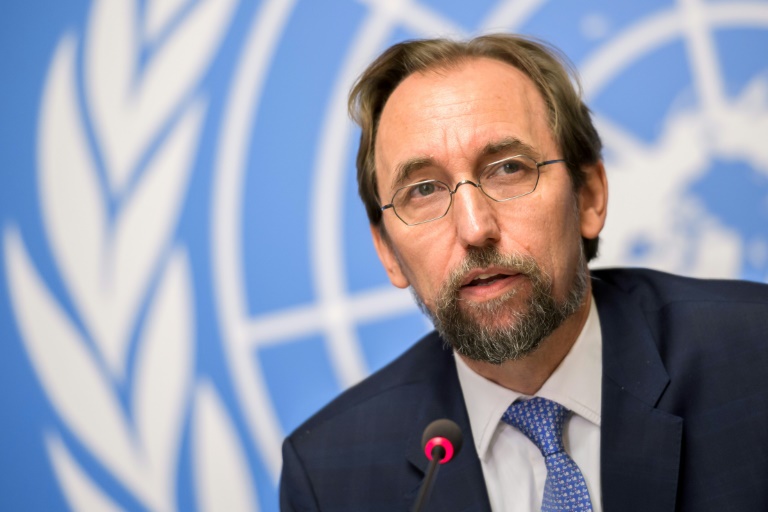In an interview with AFP, UN High Commissioner for Human Rights Zeid Ra’ad Al Hussein warned of a general “erosion” in human rights situations around the world.
He decried the “extreme barbarity” on display in conflicts raging in Syria and Yemen, and accused Myanmar of planning the recent deadly crackdown on its Rohingya minority, which he said could amount to “genocide”.
Sitting in his spacious office in Geneva, the 53-year-old career diplomat also voiced concern over developments in the world’s more peaceful region, pointing to the swearing-in Monday of Austria’s new government.
He warned that the new Austrian Chancellor Sebastian Kurz’s decision to take hard-right positions on things like immigration to win support marked “a dangerous development… in the political life of Europe.”
Austria’s far-right Freedom Party (FPOe) was sworn in Monday as part of the new government, headed by Kurz and his conservative People’s Party (OeVP).
Kurz took over the OeVP in May and yanked it to the right, securing his party first place in October elections.
“I am unsettled by what has happened in Austria,” Zeid said, accusing Kurz of moving “hard-right on the issue of immigration … (to) secure the votes that had previously gone to Freedom Party in order to win the chancellorship.”
– ‘Complete opportunism’ –
Kurz, he warned, had displayed “complete opportunism”, and was setting a dangerous example for politicians around Europe.
“I think the demonstration effect to other leaders in Europe could be something that we need to pay a deep attention to,” Zeid said.

In an interview with AFP, UN High Commissioner for Human Rights Zeid Ra’ad Al Hussein warned of a general “erosion” in human rights situations around the world
Others, such as France’s Marine Le Pen and Geert Wilders in the Netherlands, who have been unable to win at the ballot box with a purely hard-right approach might learn from Kurz’s approach, he warned.
“That is a dangerous development.”
Zeid harshly criticised politicians willing to turn to “the peddling of fear as a means of getting to political office.”
He warned of the rise of a “sort of ethno-nationalism” across Europe, and stressed that the continent had been beset by such ideas before.
“We just have to wind back 104 years (to before World War I) and we were there,” he said.
“The extreme right really has to think very carefully (about) where they are leading their countries and the continent more generally.”
Europe is not the only place beset by populist rhetoric.
Zeid reiterated his warning that US President Donald Trump’s relentless attacks on the media could trigger violence against journalists.
And he cautioned that Trump’s comments have “seemed to find an echo in other countries where leaders who were inclined to shut down civil society or the media were resorting to the same language.”
“I think we all recognise how dangerous that is,” he said.
– Possible ‘genocide’ –
One place where the “fake news” label has been used to dismiss uncomfortable reports is Myanmar, where a brutal crackdown on the Rohingya minority has left thousands dead and seen more than 655,000 people flee across the border into Bangladesh in the past four months.
Rohingya Muslim refugee walks out of a makeshift raft after crossing the Naf River in November 2017
Myanmar has consistently denied committing atrocities in Rakhine, saying the crackdown was a proportionate response to the Rohingya militants who attacked police posts on August 25, killing around a dozen officials.
But Zeid said the evidence did not seem to support that, but instead indicated that “these operations were organised and planned.”
“You couldn’t exclude the possibility of acts of genocide… You cannot rule it out as having taken place or taking place,” he said, adding that courts would need to determine if the word was truly appropriate.
He said he had faith that the perpetrators would eventually be brought to justice.
“Those who are committing crimes now and believe they have security, they have the support of great powers … shouldn’t feel so self-assured about this,” Zeid said.
He also said courts should determine how much responsibility Myanmar’s civilian leader and Nobel Peace Prize laureate Aung San Suu Kyi held for the violence.
“The evidence will point eventually to who’s culpable and who isn’t.”
– Extreme barbarity –
Accountability is also key to ending the devastating and drawn-out conflicts in Syria and Yemen, Zeid said, insisting that perpetrators of a wide array of horrifying abuses there “have to be dragged up before courts.”
“It cannot be that we have seen this extreme barbarity, and no one is held legally responsible for it,” he said.
Zeid, who has not shied away from criticising countries large and small alike since he took over the UN rights office in September 2014, told AFP he would not be seeking a second mandate when his term expires next August.
“I will move on to other issues,” he said, adding that he believed heading the UN rights office should be a one-term position to avoid any pressure to “negotiate” the necessary country support for a second term.
“I think it is important to always maintain the integrity of this office,” he said, adding that “any suggestion of wheeling and dealing … on the back of rights is lamentable.”
Download our app